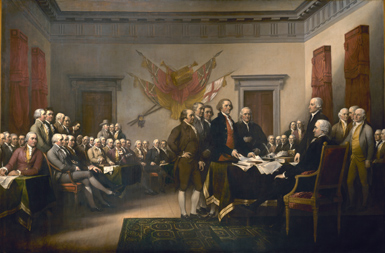The War of 1812 served as the final act of the American Revolution, which was a complex and prolonged drama that lingered for a generation beyond the peace treaty of 1783 and the Federal Constitution of 1787.
"Seventeen slaves and no hoop will not make a barrel that can last long." British Spy John Henry, on the weak union of the United States

Architect of the Capitol
Many Americans, and more Europeans, doubted that any republic could endure but especially not one so large and diverse. Inevitably, the critics expected the various states violently to separate and perhaps then pass under the imperial domination of Spain, France, or Britain.
Despising the new republic, the British and their American loyalist supporters celebrated the mixed constitution of Great Britain—the combination of commons, lords, and monarch—as more stable, just, and powerful. Where the American patriots sought to disperse and reduce the power of government, the British sustained an empire with the coercive “energy” to wage war and to regulate the liberty of common people.
By British standard, the United States was a flimsy union of discordant states: a virtual nullity. A British spy, John Henry, dismissed the republic as “that crazy coalition of heterogeneous interests, opinions and prejudices.” Referring to the number of states and their weak union, Henry concluded, “Seventeen staves and no hoop will not make a barrell that can last long.” According to British officials, the foolish Americans lived in a fantasy republic that pandered to their illusion that they need neither pay for nor obey their federal government.
The British also regarded Americans as doubly damned for owning black men while preaching the equality of white men. To Britons, it seemed odd that race mattered so much, and class so little, in the distribution of political rights in America. In sum, British officials disliked the republic as weak, chaotic, corrupt, rancorous, vulgar, and demagogic. A Canadian prelate, John Strachan, concluded, “Liberty in such a country becomes worse than an empty name, a mask for oppression.”
After the revolution, the British Empire and the United States remained uneasy neighbors in North America. During the 1780s and 1790s, the British built a counterrevolutionary regime in Canada, beginning with 40,000 American loyalists expelled by the patriot victory. In Upper Canada (now Ontario), they sought to set an example of superior stability and prosperity that eventually would entice the rebel Americans to forsake their dangerous experiment in republican government. Loyalists did not believe that the British Empire had permanently lost the fight against the American Revolution.
Neither Britons nor Americans thought that their rival political systems could coexist for long in a shared continent. Britons predicted that the republic inevitably would collapse into anarchy and civil war. Surely, repentant Americans would then beg for readmission into the empire. With equal conviction, Americans insisted that nature destined their republic to dominate the continent. Eventually, they predicted, the Canadians would join the United States by rejecting the artificial rule of a foreign empire. Created by the revolution, the border between the republic and the empire seemed tenuous and temporary: destined to shift either north or south as one or the other collapsed. Ironically, until 1812, the parallel convictions of inevitable collapse kept relations tense but short of war, for why risk blood and treasure on an invasion when the rival’s collapse would come naturally in due time?
Part of a series of articles titled From the American Revolution to the War of 1812 .
Next: Slow drift to a new war
Last updated: March 6, 2015
